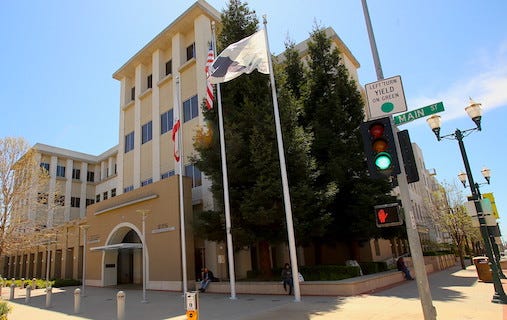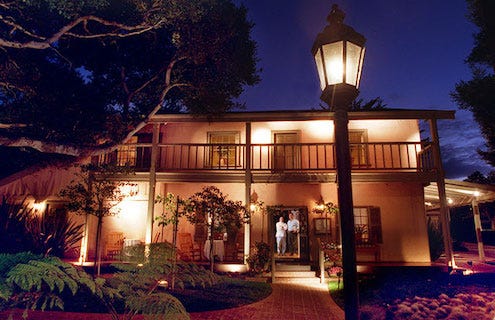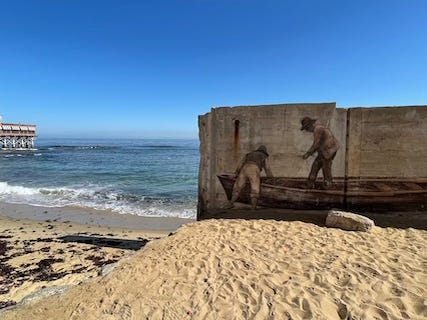This Week on the Central Coast
Watsonville takes action on climate change, PRIDE industries teams up with DLI, MBARI and UCSC unlock Comb Jellyfish genome, and a new restaurant opens at haunted Stokes Adobe
Watsonville’s Community Forest Program lets people Adopt-A-Tree
The program was launched by the city and Watsonville Wetlands Watch and was made possible thanks to a grant from the California Department of Fire and Forestry and the California Climate Investment Program. The group hopes to plant 8,000 trees in its first phase. So far, 410 trees have been planted and nearly 70 people have signed up. The group noted all the benefits of having an “urban forest”, including cleaner air, more shade and cooling, higher quality of water in wetlands, and capturing atmospheric carbon which helps to address climate change. Additionally, more greenery will increase property values and simply make the city’s streets and trails more enjoyable.
Watsonville also made plans to aggressively cut greenhouse gas emissions.
Last month, Watsonville was the first California city to urge “Governor Newsom to declare a state of emergency for the climate crises.” The city put together its own plan to tackle climate change more aggressively than the state’s goals. Watsonville’s climate plan includes exploring off-grid energy alternatives, such as solar and battery systems, and “climate-smart agriculture” practices. These include composting, riparian restoration, cover cropping, and reduced tillage. These practices would greatly benefit city residents by reducing exposure to synthetic fertilizers and pesticides. The city has already made plans to install twelve new EV charging stations. The city is also home to Santa Cruz County’s only electric METRO bus fleet.
Watsonville’s plan aims to reduce greenhouse gas emissions by 80% by 2030. To compare, California’s goal is to reduce emissions by 40% within the same timeframe. Mayor Jimmy Dutra said “You may think it would be other parts of the county, but it is Watsonville who is leading - we are the ones requiring compostable takeout containers, banning plastic, collecting food scraps. I hope we can continue being the voice of reason for this area.”
Pride Industries teams up with the Defense Language Institute
Pride Industries is a training and recruitment organization that focuses on bringing equal employment opportunities to people with disabilities. They have expanded to also help veterans and foster kids. The Pride employees at the DLI do janitorial work. Of the 26 employees, about three-quarters of them have disabilities. One of the Pride employees has grown his skills enough to start his own business, called Phil’s Custodial Services.
“Pride industries has an employment helpline called I AM ABLE that is dedicated to helping people with disabilities, military veterans, former foster youth, and trafficking survivors find a job.” Those who would like to use the helpline can call 844-I-AMABLE (844-426-2253).
The genetic code of comb jellyfish was decoded by MBARI and UCSC researchers.
This is “only the fourth time scientists have decoded the genome of animals at the base of the evolutionary tree.” Millions of comb jellies live in the Monterey Bay. They are see-through and about the size of a grape. They are the ancestors of some of the world’s oldest animals. I decided not to summarize the article too much because it does an incredible job of explaining the process of “decoding the genome” and why we want to do it. The Monterey Bay Aquarium Research Institute also goes in-depth on how the delicate creatures are collected for research and provides a video of the jellies.
A new restaurant opened at Stokes Adobe.
The restaurant, simply named “Stokes Adobe”, has opened at the site of its namesake, where former restaurant Restaurant 1833 was located. The menu features modern California Cuisine with creative craft cocktails. The pricing is pretty standard for the area - All cocktails are $14 and the most expensive entree is $28.
However, this building’s history is much more on-theme with yesterday’s holiday.
The building is named after James Stokes, who was its second owner. Stokes defected from the British Navy in 1837 and took a case of medicine with him. He set up shop (illegally) as “Dr. Stokes” and began treating people with the stolen medicine. He had no actual medical training and, of course, ended up killing many of his patients. He married the widow of one of the patients he killed, jump-starting his family with four children, before having two more with his new wife. By 1844, Stokes added on to the building to accommodate his growing family. Years later, Stokes sold the home to a baker, who was the first to convert the building into a combination residence / commercial business. Stokes’ death has differing circumstances. Some believe he hanged himself while others believe he poisoned himself.
The building’s violent past has led to many former employees telling stories of hauntings. Furniture and drinking glasses have moved on their own. Some employees have heard a woman’s voice calling their names down the hallways. Others even report seeing Stokes himself.
Despite it’s haunting reputation, the new owners have yet to experience any supernatural events. They are optimistic that the spirits will be happy to be around the joyful energy of their restaurant.
You can also check out this article to read about more haunted spots in Monterey.









